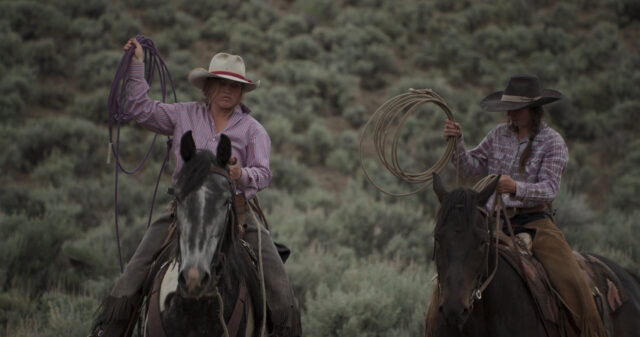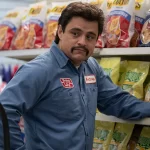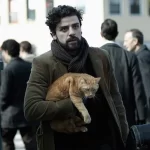Bitterbrush: Start Me Up, by David Bax

Colie and Hollyn, the subjects of Emelie Mahdavian‘s breathtaking new documentary Bitterbrush, are modern day cowboys. Yes, they’re women but even they refer to what they do for a living as “cowboying.” Calling them modern is more a fact than a useful descriptor. Sure, they might crack open a Pepsi when they kick up their boots for lunch and their conversations might turn to talk of bank loans and health insurance. But the methods by which they go about their jobs would appear to be relatively unchanged from the “old-timey” association we have with this kind of work.
That all makes a great deal of sense, actually, given that Mahdavian has followed Colie and Hollyn to a staggeringly vast and seemingly untouched section of the American West. Bitterbrush never calls out specifically where it takes place but there’s an Idaho license plate visible in at least one shot. Mahdavian and her cinematographers Derek Howard and Alejandro Mejía don’t waste any opportunity, alternating between vistas looking down on the women from hilltop perches and shots that follow the subjects as they ride, experiencing the land, the wildlife and each other from the same vantage point that they do. In the latter, it’s as if the operator is also astride a horse, keeping pace with Colie and Hollyn; possibly, the camera is on a rig that achieves this height on its own as that seems impractical.
These women only work one piece of land at a time, signing a contract to herd up a certain minimum number of cattle in a matter of months. After that, they move on to the next gig. Talk of family back home makes it clear how much Colie and Hollyn value their independence, how much this way of life works for them while allowing them, by nature of its transience, a way out if it ever stops working for them. In a sense, Bitterbrush could be viewed as an answer to Nomadland, a movie that highlighted the desperation inherent in itinerant lifestyles in today’s America.
While not a documentary, Nomadland did feature plenty of non-actors, appearing as personas based on their own. Some of them seemed to be camera-ready naturals. Colie and Hollyn, on the other hand, underline how unaccustomed they are to outsiders by being endearingly awkward in the early parts of the movie. They speak self-consciously, even to one another, and Hollyn is hilariously shy about getting a kiss from her ranch-hand sweetheart in front of the camera.
But, as always happens in good documentaries, they soon forget to think about it, forget to worry about how they’re coming across when they speak. This leads to one of Bitterbrush‘s most powerful moments, Colie’s musing about massaging the hands of her dying mother. It’s unguarded, vulnerable and poetic. And it never could have come out of her in the early going.
Another standout sequence involves Hollyn “starting” a colt. You may watch the scene and, having seen other movies about horses, think this is the same thing as “breaking” a horse. A quick search of the terms reveals that they are, in fact, two different methods. The “starting” that Hollyn’s doing is a process based on trust. Bitterbrush is an argument in favor of making documentaries the same way.





























